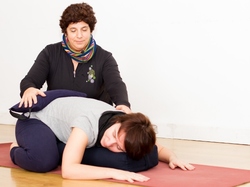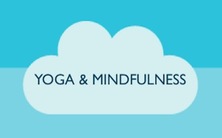 A restorative practice frequently relies on the use of props and the prolonged holding of a few simple poses to achieve a deep level of relaxation. But what exactly makes this style of yoga unique? Here are some of the benefits a restorative yoga practice has to offer. Slows Down the Pace of Life Restorative yoga is an excellent opportunity to disconnect from the frenetic activity of daily life and let your speedometer return to 0 mph. It offers a welcome respite among all the turbulence of life and helps to prepare the mind and body for the inward stroke of meditation and deepened awareness. Moving slowly through the poses allows you to explore your mind and body at a steady and natural tempo. Soothing to the Nervous System The slower pace and deep breathing that you get in a restorative yoga class triggers the parasympathetic nervous system from the very first pose. This activation helps to mitigate the effects of the regular fight-or-flight stress response that can be damaging to your physiology and well-being. The overall calming effect on the nervous system sets a deeply relaxing tone for the class that comforts your mind and body down to the cellular level. Encourages Mindfulness Restorative yoga could just as easily be called “mindful yoga” due to the expanded awareness of self and body that comes through the practice. Slower movements cultivate space for a deeper experience of the poses and the breath. Awareness of the physical sensations, the thoughts or emotions that arise, or sounds in the environment, can all take on a much more profound significance in the depth of the restorative practice. Simply put, you’re able to notice and feel more of the world through your yoga experience. Fosters Transcendence On the whole, many forms of Hatha yoga are considered a precursor to extended periods of meditation. Through the practice, muscles, joints, and subtle energy centers are enlivened to help facilitate a deeper and more comfortable experience of meditation. However, the practice of restorative yoga in and of itself often leads to a transcendent experience of deep oneness with the universal level of consciousness. Each pose and each breath serves to lead you further up the ladder of expanded awareness. As the practice expands, the vehicle of yoga carries you from the waking state of consciousness into the silent space between your thoughts—the space from where you’re able to glimpse the soul and awaken the divinity within. Cultivates Heightened Body Awareness The comfortable pace of restorative yoga opens the doorway to a deeper understanding of your own body, letting you actually feel what it means to be a spiritual being having a human experience. Sadly, many people aren’t intimate with their own bodies. Through a restorative yoga practice, however, such intimacy can be explored and embraced. Deeper levels of bodily strengths can be integrated and owned and a more profound sense of self-love and acceptance can emerge. Deepens Self-Awareness and Introspection The subdued quality of a restorative yoga class often helps you draw attention inward and away from external events and situations of the world. With your awareness directed within, the practice becomes a sanctuary for the mind and spirit from which you can take a deeper look at who you are, what you want, and how you can serve the world. Restorative yoga opens us up to new levels of self-exploration and contemplation, allowing your inner being to shine forth. Creates Deliberateness of Action Through the mindfulness of the practice, you become increasingly aware of your actions or karmas, and how they influence your level of comfort or discomfort. You can see the direct cause and effect relationship between your poses, breathing, and overall level of well-being. As this experience continues to deepen, you begin to make more deliberate and attentive choices, both on and off the mat. Strengthens Acceptance and Detachment By its very nature, the restorative yoga practice is the antithesis of the “no-pain-no-gain” mentality. You receive the greatest benefits from your practice not through forcing yourself into a pose, but by releasing and surrendering to it. This mentality helps to cultivate acceptance of your body and its inherent limitations. Further, it strengthens your ability to let go of preconceived notions of your body and how you think it should look or feel, both in and out of a pose. When increased ease and comfort are the theme of your yoga practice, acceptance and detachment naturally emerge as a result. Helps You Feel Safe and Nurtured In daily life it’s easy to get pulled into the insecurity that is a byproduct of the modern world. Many people move through their days haunted by fear, anxiety, and uncertainty. Restorative yoga provides you with a safe harbor wherein you can reconnect with your true nature, which is immortal, invincible, pure, and nourishing. Making that connection through your poses, breathing, and deep relaxation restores the memory of who you are and helps you to reclaim the fearless nature of your soul. From this refuge, you emerge feeling secure in the inherent goodness within your heart and in the world. Connects You to the Divine and Establishes You in Pure Being The ultimate goal of yoga is union with the divine. Therefore, your practice should be a means to that end. Luckily, restorative yoga is the perfect vehicle to help you reconnect with the divinity within. Through the techniques of the practice, you awaken grace, poise, flexibility, balance, strength, and present moment awareness. This combination creates a mind and body ideally suited for seamlessly merging into the non-local field of awareness, or pure being. As a tool for self-transformation, restorative yoga facilitates the integration of all the layers of life—environmental, physical, emotional, psychological, and spiritual—culminating in the goal of all goals, awakening to your own divine nature. The benefits listed here may not be isolated solely to restorative yoga, but they are some of the most defining benefits to this type of practice. If you’ve never explored this style of yoga, this is your open invitation.
0 Comments
 Every day I see (with a little bit of envy I have to confess!!) how Mindfulness is becoming more and more popular. Everyone you know is talking about mindfulness and probably practising right now. And it is great. No complains! We need more of that! But (always a but, isn’t it?) I can’t understand how Yoga have lost it space as THE mindful practice of all times. Because Yoga is mindfulness!! So, how it is possible that a person that practice yoga is talking too about mindfulness as something completely different from Yoga, as something that they have to add in order to be complete, to have a better life? Yoga for the body, mindfulness for the mind and spirit What???? You can have both in the same class. Yoga and Mindfulness Yoga is Mindfulness!! Since yoga become a trend in our modern world, we (teachers, studio owners, magazines and publications, social media) have allowed the physical, the external part of the yoga take over our yoga practice. Every day we are told the physical benefits of the yoga practice or how to perform this or that pose and that is ok, nothing wrong with that. We have allowed people to believe that achieving that pose is the only thing that matter. And that is wrong! And it is driving me crazy! Focusing only on the external (the shape of the poses against the person who perform it) we are missing the very base of the yoga practice that is the connection, the union between body, mind and spirit… Pretty basic (it is the definition of Yoga for Christ sake!) and yet, we have forgotten it. Yes, there are teachers (bless them!!) out there trying to keep the real yoga flame alive, but, let’s be honest, is a minority… People is prepare to hear “mindfulness talk” in a mindfulness practice, but when you talk “mindfulness” in a yoga class people looks at you as: Ok, what is this? I came here for the stretch!! As a teacher I am falling in the same trap every day, limiting myself to focus more on the physical part, but enough is enough!! I want to do the “mindfulness talk” in my yoga classes. I am ready to talk mindfulness all the time in my classes! I invite you to do the same! Yoga deserve it! And people deserve it too!  Affirmations are positive statements or self-scripts that can condition the subconscious mind to help you develop a more positive perception of yourself. Affirmations can help you to change harmful behaviours or accomplish goals, and they can also help undo the damage caused by negative scripts, those things which we repeatedly tell ourselves (or which others repeatedly tell us) that contribute to a negative self-perception. Affirmations are easy to create and use, but you'll need dedication to make them work. Think about what negative scripts you want to counteract or what positive goals you want to accomplish. Affirmations can be extremely useful to counteract negative perceptions you have developed about your appearance, your abilities, or your potential (we'll refer to these types of affirmations as "counter-scripts"). Affirmations can also help you achieve specific goals, such as losing weight or quitting smoking. Make a list of your goals or the harmful self-perceptions you want to change. Using Affirmations: Prioritize your list of things to work on. You may find that you have a lot of goals or that you need many counter-scripts. It's best, however, to concentrate on just a few affirmations at a time, so choose those that are most important or most urgent and work with those first. Once you see improvement in those areas or accomplish those goals you can develop new affirmations for other items on your list. You can try using as many affirmations as you want at any given time, but you may want to start by using no more than five. Writing and Working on your affirmations: · Start with "I," and be short, clear, and positive. Use present tense. · Write it in a way that you can feel it right for you (using words that are meaningful for you or in a way that you can believe it) · For example is you want to use “I Love myself” but you feel that you can’t believe yet, you can try: “I am willing to love myself everyday a little bit more” · Make your affirmations visible so you can use them. Repetition is the key to making affirmations effective. You want to think about your affirmations several times a day, every day. · Make a point of writing your affirmations in a journal or diary each morning when you wake up and each night before you go to sleep. Repeat the affirmations to yourself at these times, as well. · Ideally, your affirmations should be the first thing you think of when you wake up and the last before you go to sleep. · Meditate on your affirmations. Close your eyes, shut out the rest of the world, and think about your affirmations. Say and repeat the words, but think about what the words mean to you; think about the future and try to feel the emotions that the affirmations evoke. · Leave reminder cards in various places. Use 3X5 index cards or sticky notes to write your affirmations (one per card). Make several cards for each affirmation, and then leave these cards where you will see them: place one where you sit at the kitchen table, tape one to your car's steering wheel, slip one inside your desk drawer, or stick one to your computer monitor, etc. Each time you see the card, read it and think about what it means. · Carry your affirmations with you. Make a list of your affirmations and put it in your wallet or purse. If you need a pick-me-up, or if you find yourself about to waver from your goals, get out your affirmations and read them. · Continue using your affirmations. The more you affirm something, the more firmly your mind will accept it. If you are trying to accomplish a short-term goal, use your affirmations until you have accomplished it. If you simply want to use affirmations as a counter-script, use each one as long as you like. Here some examples! Love: · I love and approve myself exactly as I am // I love and accept myself exactly as I am · I am beautiful and everybody loves me · Love surrounds me and protects me · I am willing to: see my own beauty and worth to love myself exactly as I am to learn to love and accept myself · I deserve love and happiness · I deserve love and I accept it now · I attract only loving, caring people into my life · I forgive and I am forgiven · As I learn to love myself I find it easier to forgive/love/to feel appreciated. Prosperity and Abundance: · I deserve the best and I accept it now · I am open to receive · I open and receptive to all the good that life have to offer · Life/Universe/God provides me with everything I need · I trust that life protects me and brings me everything I need Trust: · Life/Universe/God supports me and guide me · I am always protected and safe · All is well · All is well in my life · Everything is working out for my highest good · I trust life/Universe/God to take care of me · I let go and I trust. I am free · I trust in the process of life Fear: · I now release myself from all pain, hurt and rejection in my past. I am free · I have nothing to fear · Whatever happens I can handle it Health: · I am healthy, loved and completed · My healing is already in process Confidence and Self Esteem: · I am confident // I believe in myself and my abilities · I am strong, powerful and confident // I move through life with confidence and ease · I trust myself // I am good enough, I am more than good enough · My good comes from everywhere and everyone // My income is constantly increasing · My work is fulfilling and I am appreciated // I open new doors to life · Wonderful new opportunities opening up for me You are always, always loved and protected. You are good enough. You deserve to live a wonderful life and so it is…  You are always, always loved and protected. You are good enough. You deserve to live a wonderful life and so it is… 1) Stop criticizing yourself: If we tell ourselves that we are okay, no matter what is going on, we can make changes in our lives easily. It is when we make ourselves bad that we have great difficulty. Our ability to adapt and flow with the process of life is our power. Think for a moment about the words you use when scolding yourself or some of the phrases you hear when you were small: stupid, bad boy, bad girl, useless, careless, dumb, ugly, worthless, sloppy, dirty, etc. Are these the same words you use now when describing yourself? There is a tremendous need to build self-worth and value in ourselves, because when we feel not good enough, we find ways to keep ourselves miserable. We create illness or pain in our bodies; we procrastinate about things that would benefit us. We are all insecure in some ways because we are human. Let release the need to be perfect. Having to be perfect only puts immense pressure on ourselves, & it prevents us from looking at areas of our lives that need healing. Instead, we could discover our creative distinctions, our individualities, & appreciate ourselves for the qualities that makes us unique. 2) Stop scaring yourself: Many of us terrorize ourselves with frightful thoughts & make situations worse than they are. We take a small problem and make it into a big monster. It's a terrible way to live, always expecting the worst out of life. Examples: Someone makes a remark at work, and you begin to think you're going to be fired. You build these paralyzing thoughts in your mind. Remember, these frightening thoughts are negative affirmations. OR, people who are ill often visualize the worst or they are immediately planning their funerals. OR, someone doesn't call you immediately, and you decide that you are totally unlovable and you'll never have another relationship again, feeling abandoned and rejected. If you find yourself habitually reviewing a negative thought or situation in your mind, find an image of something you really would like to replace it with. It could be a beautiful view, or a sunset, or flowers, a sport, or anything you love. Use that image as your switch-to image every time you find that you are scaring yourself. Say to yourself, "No, I'm not going to think about that anymore. I'm going to think about sunsets, roses, Paris, yachts or waterfalls, or whatever your image is." If you keep doing this, eventually you will break the habit. 3) Be gentle and kind and patient with yourself: Impatience is a resistance to learning. We want the answers without learning the lesson or doing the steps that are necessary. Think of your mind as if it were a garden. If you take loving care and attention to this garden, it gradually keeps improving and will blossom. The same with your mind, you select nurtured thoughts & with patience they grow and contribute to creating the garden of experiences you want." 4) Be kind to your mind: Let's not hate ourselves for having negative thoughts. We can think of our thoughts as building us up rather than beating us up. We don't have to blame ourselves for negative experiences, but can learn from these experiences. Being kind to ourselves means we stop all blame, all guilt, all punishment, and all pain. Relaxation is absolutely necessary for tapping into the Power within, because if you are tense & frightened, you shut off your energy. As you become tense, take a few deep breaths, close your eyes, and release whatever tension you are carrying. As you exhale, become centered & say to yourself silently: "I love you. All is Well." You will then notice how much calmer you feel. 5) Praise yourself: Criticism breaks down the inner spirit, and praise builds it up. When you berate yourself, you belittle the Power that created you. Begin with little things." 6) Loving yourself means supporting yourself: Reach out to friends and allow them to help you. You really are being strong when you ask for help when you need it. Support groups can help, like 12 step-groups. 7) Love your negatives: No matter what negative situation you are in, it's there for a reason; otherwise you wouldn't have it in your life. 8) Take care of your body: Drug and alcohol abuse, overeating, and smoking are just some of the substances we take into our bodies to numb out the pain, and deal with life better. But, the sad fact is that it doesn't help make it better. Take care of yourself, exercise regularly so your body can help support you in whatever comes your way. 9) Mirror work: In order to find out the cause of an issue that keeps us from loving ourselves. Try looking in the mirror the first thing in the morning and say, "I love you. What can I do for you today? How can I make you happy?" Listen to your inner voice, and start following through with what you hear. Then, if something unpleasant happens to you during the day, go to the mirror and say: "I love you anyway." Affirmations performed in front of a mirror are advantageous because you learn the truth of your existence. When you do an affirmation and you immediately hear a negative response such as, "Who are you kidding? It can't be true. You don't deserve that", that is a gift you can use. You cannot make the changes you want until you are willing to see what is holding you back. The negative response you have just discovered is like a gift in that it becomes the key to freedom. Turn that negative response into a positive affirmation such as: "I now deserve all good. I allow good experiences to fill my life." Repeat the new affirmation until it does become a new part of your life. 10) "Finally, love yourself now! Don't wait until you get it right. Dissatisfaction with yourself is a habit pattern. If you can be satisfied with yourself now, if you can love and approve of yourself now, then when good comes into your life, you will be able to enjoy it. Once you learn to love yourself, you can begin to love and accept other people. We can't change other people, so leave them alone." |
Claudia Gutierrez
Physical Therapist Yoga Teacher Fitness Instructor Life Coach Dreamer... [email protected] Categories
All
Yoga Fitness BlogI am Claudia Gutierrez, owner of Yoga Fitness, originally from Argentina and proudly Irish Citizen since 2012. Archives
November 2021
|

 RSS Feed
RSS Feed
